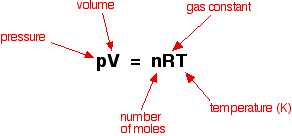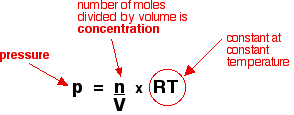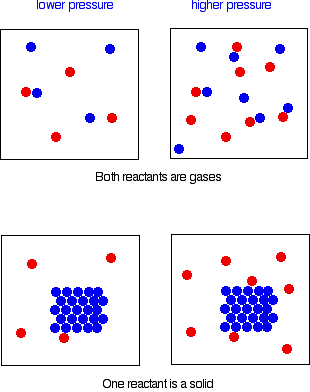|
THE EFFECT OF PRESSURE ON REACTION RATES
This page describes and explains the way that changing the pressure of a gas changes the rate of a reaction. The facts What happens? Increasing the pressure on a reaction involving reacting gases increases the rate of reaction. Changing the pressure on a reaction which involves only solids or liquids has no effect on the rate. An example In the manufacture of ammonia by the Haber Process, the rate of reaction between the hydrogen and the nitrogen is increased by the use of very high pressures. In fact, the main reason for using high pressures is to improve the percentage of ammonia in the equilibrium mixture, but there is a useful effect on rate of reaction as well. | |
|
Note: If you want to explore equilibria you will find the topic covered in a separate section of the site. | |
|
The explanation
The relationship between pressure and concentration Increasing the pressure of a gas is exactly the same as increasing its concentration. If you have a given mass of gas, the way you increase its pressure is to squeeze it into a smaller volume. If you have the same mass in a smaller volume, then its concentration is higher. You can also show this relationship mathematically if you have come across the ideal gas equation:   | |
|
Note: If you should be able to do calculations involving the ideal gas equation, but aren't very happy about them, you might be interested in my chemistry calculations book. | |
|
The effect of increasing the pressure on the rate of reaction Collisions involving two particles The same argument applies whether the reaction involves collision between two different particles or two of the same particle. In order for any reaction to happen, those particles must first collide. This is true whether both particles are in the gas state, or whether one is a gas and the other a solid. If the pressure is higher, the chances of collision are greater.  If a reaction only involves a single particle splitting up in some way, then the number of collisions is irrelevant. What matters now is how many of the particles have enough energy to react at any one time. | |
|
Note: If you aren't sure about this, then read the page about collision theory and activation energy before you go on. Use the BACK button on your browser to return to this page. | |
|
Suppose that at any one time 1 in a million particles have enough
energy to equal or exceed the activation energy. If you had 100 million
particles, 100 of them would react. If you had 200 million particles
in the same volume, 200 of them would now react. The rate of reaction
has doubled by doubling the pressure. | |
Saturday, 22 June 2013
THE EFFECT OF PRESSURE ON REACTION RATES
Subscribe to:
Post Comments (Atom)
No comments:
Post a Comment